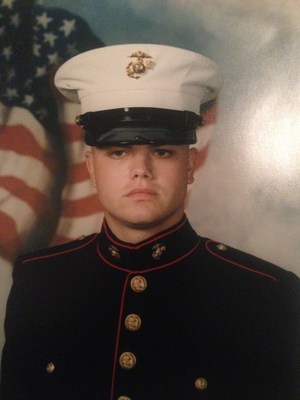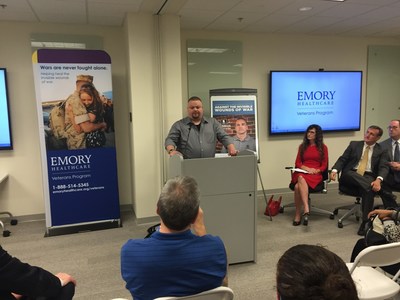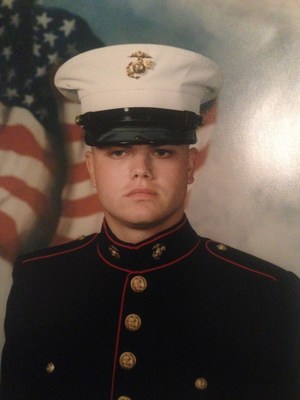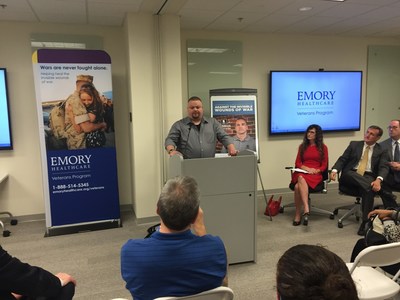Wounded Veteran Finds Help, While Seeking Sticker
ATLANTA, June 24, 2016 /PRNewswire-USNewswire/ -- For Matthew Barnes, recovery started with the search for a sticker. Had Matthew not gone to woundedwarriorproject.org looking for a decal to put on his father-in-law's new work helmet, he may have never come across Warrior Care Network™.

Wounded Warrior Project® (WWP) partnered with four top academic medical centers across the country to form Warrior Care Network in 2015. This world-class health network provides mental health care for wounded veterans dealing with post-traumatic stress disorder (PTSD) and traumatic brain injury (TBI) regardless of where they are located, and the care being provided is free of charge.
Matt traces his problems back to a Marines deployment in Iraq in 2003. While on patrol with his unit, a bomb destroyed a mosque near Najaf. Matt estimates that explosion rocked the city just a block away from him.
Matt did not initially want to talk about the traumatic experience with anyone; he still is not ready to share it with the public.
Matt says the blast haunted him for the rest of his military career and continued to cause issues until recently. He initially learned from a military friend to deal with the issue in an unhealthy way – self-medicating.
"I wasn't having the nightmares anymore because I wasn't sleeping."
Two years after the explosion, a failed drug screening led Matt Barnes right out of the Marine Corps.
"It was a wake-up call. I've been clean since March 8, 2005."
While Matt took positive steps, he says he still had challenges at home, challenges that led to two failed marriages.
"I was dealing with post-traumatic stress disorder (PTSD), but I didn't even know it," Matt said. "It took my third wife noticing my anger and frustration, and telling me about my issue."
While Matt first registered with WWP in 2006, he says he didn't engage with the organization or other warriors.
"My PTSD was too bad, and I didn't even realize it. I didn't like new people; I didn't like crowds. I pretty much isolated myself."
That isolation is common for people dealing with PTSD, and is a common problem in slowing down a veteran's recovery.
A request from Matt's father-in-law led Matt to the Wounded Warrior Project website. While looking to purchase stickers for a work hat, Matt came across a banner for Warrior Care Network.
That led Matt to find additional information and signing up for care. It also changed Matt's life.
"I got a call just a couple of days after registering. I was skeptical at first, but still went to Emory Healthcare."
Part of the treatment left Matt in tears.
"It was harder than going through boot camp."
Every day, Matt sat with a therapist and recounted the circumstances around that explosion in Iraq. The therapy is called prolonged exposure. A patient relives everything about a traumatic experience, the sights, the smells, and explores every detail. In Matt's case, that meant talking about an uncomfortable subject, something he previously avoided. Doctor's probed Matt's memory daily; then Matt would listen to the sessions at night in his room.
"You walk through the event; then you walk through it again. Over and over," Matt said. "It's like a cluttered closet; you don't want to deal with it, but prolonged exposure takes everything out of the closet, and puts it where it belongs."
The sessions took a lot out of Matt, but he says it started helping.
"The first night or two, your PTSD is reinforced, and you can't sleep. It forces you to deal with your issues. By the end of the third day, you start getting through the event without any anxiety."
Instead of learning to cope with his new normal, Matt credits Warrior Care Network, and the staff at Emory, with helping him feel normal again.
"I feel like my old self. I'm out of the house as much as possible. My family and employer have noticed a change. This program gave me my life back."
Wounded Warrior Project® launched Warrior Care Network in 2015. The partnership is with Emory Healthcare Veterans Program, Massachusetts General Hospital Home Base, Rush University Medical Center Road Home, and UCLA Medical Center Project Mend. Warrior Care Network provides innovative mental health care on an intensive 2-3 week outpatient basis. Read more at https://www.woundedwarriorproject.org/programs/warrior-care-network.
About Wounded Warrior Project
The mission of Wounded Warrior Project® (WWP) is to honor and empower Wounded Warriors. WWP's purpose is to raise awareness and to enlist the public's aid for the needs of injured service members, to help injured servicemen and women aid and assist each other, and to provide unique, direct programs and services to meet their needs. WWP is a national, nonpartisan organization headquartered in Jacksonville, Florida. To get involved and learn more, visit https://www.woundedwarriorproject.org/.

Photo - http://photos.prnewswire.com/prnh/20160624/383171
Photo - http://photos.prnewswire.com/prnh/20160624/383172
SOURCE Wounded Warrior Project

